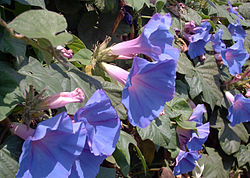Ipomoea indica
| Habit | vine-climber
| |
|---|---|---|
| Lifespan: | ⌛ | perennial |
| Exposure: | ☼ | sun |
|---|---|---|
| Features: | ✓ | evergreen, flowers, naturalizes, invasive |
| Flower features: | ❀ | blue |
|
Ipomoea > |
indica > |
If this plant info box on watering; zones; height; etc. is mostly empty you can click on the edit tab and fill in the blanks!
Ipomoea indica is a species of morning glory known by several common names, including oceanblue morning glory, blue morning glory, koali awa, and blue dawn flower. It is a tender perennial vine native to [[Hawaii|HawaiTemplate:Okinai]] and the New World tropics, but it can be found throughout the tropical and warm areas of the world as an introduced species. It has become an invasive species in both Australia and New Zealand. It is cultivated in gardens and greenhouses for its large blue flowers.
Read about Ipomoea indica in the Standard Cyclopedia of Horticulture
|
|---|
|
Ipomoea learii, Paxt. Blue Dawn-flower. St. a very rapid grower, often 30-40 ft. long, somewhat shrubby at the base: lvs. 3-6 in. long, cordate, acute, mostly entire or slightly 3-lobed, variable: fls. borne in clusters of 12- 30, opening in succession; corolla 4-5 in. broad, bell- shaped, deep lilac, sometimes dark purple with five lighter plaits. Very beautiful. Aug.-Oct. Tropics of both hemispheres; widespread.—A magnificent species for the warmhouse, but not usually satisfactory outside, at least in the N. One plant is on record as producing 60,000 fls. at the rate of 300 a day. When grown in the open the fls. are likely to be an unattractive coppery purple. Thoroughly naturalized in S. Calif., and a most useful plant for covering waste places, enbankments, and the like.
|
Cultivation
Propagation
Pests and diseases
Varieties
Gallery
References
- Standard Cyclopedia of Horticulture, by L. H. Bailey, MacMillan Co., 1963
External links
- w:Ipomoea indica. Some of the material on this page may be from Wikipedia, under the Creative Commons license.
- Ipomoea indica QR Code (Size 50, 100, 200, 500)


